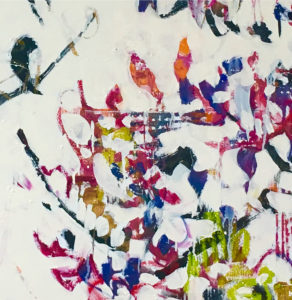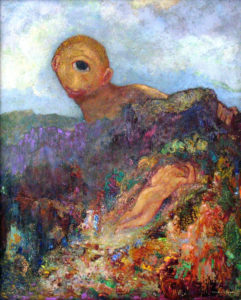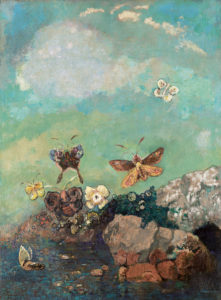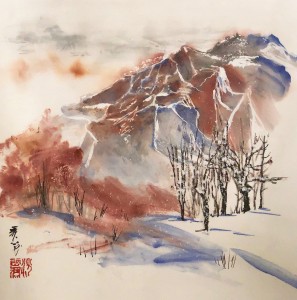Dear Artist,
Work can sit on the easel for months, even years. The afflicted artist may be dedicated, hard-working and obsessive. In mild cases he takes a very long time to get to signing, let alone to making a delivery. HP (Hyper-perfectionism) may not be widespread, but it can be devastating to a creative career.
Not only is the work never quite good enough in the mind of the artist, it may constantly develop elements that the artist feels need to be covered up or in some way changed. In analyzing the art of hyper-perfectionists, it strikes me that many of the needed changes are arbitrary and do not contribute very much to the general quality in the long run. In other words, progress may be stymied by some deeper psychological factor.
Parents or other elders are often fingered as the root of chronic perfectionism. As we ourselves are in some way not good enough, it’s easy for our work to be seen as imperfect and a scapegoat for our failed selves. The early and enthusiastic approval of a work by a friend, spouse, dealer or customer can offer some relief. But this can be difficult for shy, introverted or reclusive artists. Underlying fears and stresses need to be privately faced and understood.
While keeping in mind that “good enough is not good enough,” HP sufferers need to find role models among the confident, audacious and efficient. Inefficiency is the perfectionist’s game — but it’s often just simple dawdling and completion avoidance. By not completing, one avoids judgment.
Sufferers may respond to direct orders. One is to follow the command of American Civil War Marine Admiral David Farragut: “Damn the torpedoes, full steam ahead.” By simply getting on with the next, quality stays high, freshness prevails, and signatures happen. Further, I don’t think watching the clock is a useful tool for combating perfectionism. Perfectionists, by nature, often have little respect for time. As much as perceived quality, completion must also be seen as the truly desirable goal. One needs a dedicated drying room or office where finished work is stashed and off limits to further brushwork. My own antidote to HP is MAD (Make A Delivery). Wrapping and shipping have significantly delayed my much-anticipated lobotomy.
Best regards,
Robert
PS: “It is from the regret left by the imperfect work that the next one can be born.” (Odilon Redon)
“Better a diamond with a flaw than a pebble without.” (Confucius)
Esoterica: If you’re a perfectionist, you’re actually in good company. Leonardo da Vinci was never happy with anything. Haunted by feelings of parental abandonment, he became the Patron Saint of Procrastinators. His was a condition I call “idealistic perfectionism.” Just knowing he could do it was enough. Thinking he could make it better kept him fiddling. I still don’t feel he got Mona Lisa’s smile exactly right, do you? Maybe it was better before.
“Where you stumble, there lies your treasure.” (Joseph Campbell)
This letter was originally published as “Hyper-perfectionism” on May 1, 2009.
Have you considered a Premium Artist Listing? With each letter, an artist is featured at the bottom of this page. The Premium Artist Listings are a means of connecting artist subscribers through their work. Proceeds from each listing contribute to the production of The Painter’s Keys.
“Regularity, order and the desire for perfection destroy art. Irregularity is the basis of all art.” (Pierre-Auguste Renoir)
Featured Workshop
 Join Ellie Harold for “Intuitive Painting: Permission to Paint Expressively,” designed especially for mature women artists of all skill levels who wish to explore this medium for soulful exploration. The retreat provides attractive accommodations (your own room!) along with lightly structured activities for centering, relaxation and low stress art-making. You’ll have plenty of free time to muse, paint, write and reflect while enjoying the colors, textures and flavors of San Miguel. This Retreat has the potential to transform not only your art but your life! You’ll return home with a specific art “care plan” to assure support for further creating. Details at www.EllieHarold.com.
Join Ellie Harold for “Intuitive Painting: Permission to Paint Expressively,” designed especially for mature women artists of all skill levels who wish to explore this medium for soulful exploration. The retreat provides attractive accommodations (your own room!) along with lightly structured activities for centering, relaxation and low stress art-making. You’ll have plenty of free time to muse, paint, write and reflect while enjoying the colors, textures and flavors of San Miguel. This Retreat has the potential to transform not only your art but your life! You’ll return home with a specific art “care plan” to assure support for further creating. Details at www.EllieHarold.com.
Featured Artist
Los Angeles-based artist Lisa Chakrabarti works in a variety of media: oils, acrylics, pastels, watercolors, graphite and colored pencils. Focusing on a style she calls “romantic naturalism” – impressionism based largely on subjects in the natural world – her works have found their way into galleries in Los Angeles, Florida, Colorado and New York. In 1995, after being introduced to sumi-e and Chinese ink painting by Asian friends, Lisa became captivated by the apparent freedom and subtlety of this ancient medium. This shift in focus has informed her work ever since.









8 Comments
Great timing on this one. So many of us have the perfectionist gene! I find deadlines can be helpful (at least for signing and getting the painting out the door). Leaving those small imperfections in the painting is the best solution. Sometimes I forget what was bothering me about the painting, when I return to look again. So often, when small details are labored over, changed, removed, perfected in some way, the painting feels less alive.
That is why I stay current on memberships (AIS for one) and enter contests!
Guilty as charged! And advice noted! Thank you. I have been laboring over a commission for almost a year. I have instinctively started a couple of small paintings to work on this last month in between the commission drying days before it can be worked on again. That action has lifted my spirits and will avoid the blank canvas syndrome that inevitably strikes upon finishing a long project.
Underlying psychological issues indeed. Often this behaviour is correlated with things like undiagnosed ADHD or other disorders involving executive dysfunction. There’s a high prevalence of such things among artists. Don’t know if that was ever on Robert’s radar though.
When your art is your living, rent, food, gasoline etc then the work gets out the door.
I’m not sure what perfect is. When I get stuck and afraid to move on from an area in the painting that isn’t cooperating, I don’t think I want it perfect, I just want it to fit the whole picture. I want wrong to work, I want imperfection to fit. HP is definitely a personality glitch that I carry in all that I do. I don’t do anything to complete satisfaction, always a little voice saying… Oh well, could be better, but that will have to do because I’m done with it. :)
you’ve said it perfectly–” I want wrong to work. I want imperfection to fit” That describes my experience exactly. And those places give it something special.
I do not have that affliction. Viewers of my work often say you shudda done it better or why did you pick such an ugly boat or I can see an ostrich playing a harmonica,